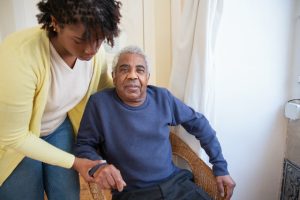How to Provide Care for Elderly and Disabled Persons
There are many factors to consider when it comes to elderly care or dealing with the needs of disabled people. First of all, you should understand that we are all placed in positions like this eventually so empathy is highly important. Caring for these individuals is about love and respect coupled with science, but also common sense depending on each situation. Each person is different, and understanding their specific condition is the first step towards proper care.
Learning about CPR Procedures for Emergencies
CPR is invaluable when working with anyone because you never know when certain ailments will sneak up on you. This is especially true for those dealing with unique conditions or old age which makes you susceptible to breaking bones easier. According to AED CPR, “Cardiac arrest may be reversed if cardiopulmonary resuscitation is performed immediately and a defibrillator is used to shock the heart and restore a normal heart rhythm within 3-5 minutes.” This is an amazing process even though it’s very frightening. You can get your online CPR renewal to stay updated and refreshed about this life-saving medical procedure. The reality is that someone is doing CPR right now somewhere in the world because heart attacks are common. The elderly and disabled are more likely to have increased frequency and severity of heart attacks because of age and underlying conditions.
Dealing with Resistance and Help Living Transitions
Sometimes it’s best if an elderly or disabled person is taken care of by professionals in a medical environment. Resistance is common for those who have been self-sustained their whole lives and many also don’t want to be away from their family. However, you have to do what’s best for your loved ones and give them a good balance of social interaction if they’re at a care facility. Frequent visits are advised so they don’t feel forgotten or unloved which is a response to the need for assisted living. There are many burdens and stresses involved with caring for them, and sometimes the right methods are outside your grasp. The best way to help people in the most severe positions is to find them a good facility.
Reduce any Background Noise and Distractions
One of the difficulties of getting older is having increased hearing difficulties. There are certain methods you can implement to help them feel more comfortable if you decide to take care of them at home. One of the strategies is to reduce any ongoing noises like the television set or radio. Repeating yourself is part of the process, and you should be kind and understanding of their position by raising your voice so they can hear better. Speak clearly and slowly so that communication with these individuals is easier. You also should be in a well-lit room so they can see your facial cues which become increasingly important.
Take Care of Them Yourself and Know Their Condition
Knowing how to take care of elderly patients is part of a nurse’s job description, and you can learn much from their process if you decide to undertake the responsibility of caring for a loved one. Knowing their condition is the first step to properly understanding what they need. No matter what setting, it’s critical they are accommodated and safe with the proper medication to alleviate any symptoms. Sometimes conditions stack up and cause complex situations, and they get more challenging usually. Gaining insight into the side effects of aging will help you develop a concrete foundation on how to address it. Always remember that their psychological well-being may depend on professional care based on the severity of their circumstance.
These Methods Will Help You Care for The Elderly or Disabled
As you can see, there are two possibilities for the elderly and disabled people who struggle to take care of themselves. Either a nursing home is necessary, or perhaps the family is willing to take care of their needs. This will vary depending on the severity of the situation, and sometimes it’s much safer for them to be placed in assisted living. The family can still support them there, and they get the consistent treatment needed in a professional and comfortable environment.

